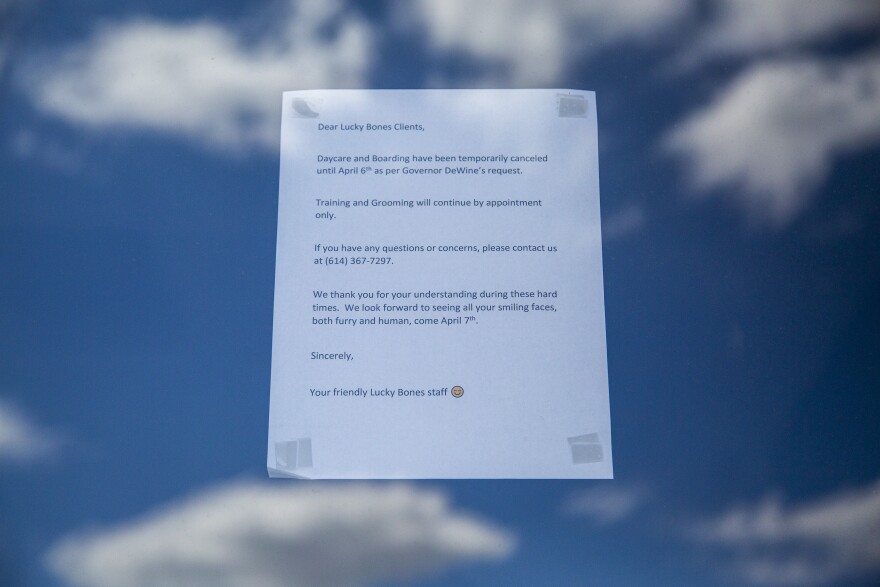At Lucky Bones, a pet grooming and day care center in Canal Winchester, the outgoing message on their voicemail is chipper but blunt: “We have just been informed by the state of Ohio that we have to close our business and all services until further notice."
Lucky Bones is one of more than 700 businesses that have been reported to Franklin County Public Health since Ohio's stay-at-home order went into effect.
Some of those complaints say companies are failing to provide proper social distancing measures or hygiene; others, that the business is non-essential and shouldn’t be open at all. But few warnings—much less citations—are actually going out.
“The animal grooming is one that was recently decided by the new governor’s dispute resolution commission,” says assistant health commissioner Alexandria Jones. “They ruled that animal grooming is non-essential, so that is why we issued that cease-desist order.”
The city of Columbus is also fielding a lot of complaints—more than 500 as of last week. They fall in two broad categories: businesses operating unsafely during the pandemic, and those that shouldn’t be open at all.
But the list of businesses runs the gamut. In addition to pet groomers, Franklin County has gotten complaints about car dealers, nail salons, even a couple of churches, which are exempt from the stay-at-home order. Some of the area’s big employers—L Brands, FedEx and UPS, Honeywell and Google—show up, too.

City and county officials follow a similar process after receiving complaints. Columbus Health commissioner Mysheika Roberts says first her team reaches out over the phone or makes a visit in person to assess what’s happening and what steps need to be taken.
“And then we will go back to make sure that they’re compliant,” Roberts says. “When we go back the second time, if they’re not compliant, we can work with our City Attorney’s Office and give warning letters and even potentially if the city attorney feels like it, fine them.”
Roberts and Jones both emphasize they see the complaints as an opportunity to intervene and educate businesses so they can stay open, rather than a way to close them down.
So far, the wave of complaints hasn’t translated into a flood of punishments. Columbus City Attorney Zach Klein says it’s just the opposite, in fact.
“Roughly 400 joint investigations done, 23 warning letters have been sent, and only one business in the city of Columbus has been elevated to my office for review for possible charges,” Klein ticks off.
He won’t name the business sent to his desk until the investigation concludes, but he said it’s a bar on the West Side that allegedly continues to serve customers.
“Multiple flagrant violations at this point of knowing that you can’t have patrons drinking beer at the bar in the middle of this pandemic,” Klein says. “I think is fairly well known by darn near everybody in the United States, if not in the city of Columbus, so we’re a little concerned about the fact pattern as alleged. We’re going to look into it, and if it warrants charges certainly we’ll bring them.”
The shutdown still stings for businesses that have complied with the orders and voluntarily shut their doors. Infinity Fitness in Westerville closed up after receiving a cease and desist order from Franklin County.
But the decision doesn’t make a lot of sense to Mike Mayhew, a trainer at the gym. He says they work one-on-one with their clients, and that’s less risky than the jobs at Lowes or Home Depot that his fellow trainers might pick up to make ends meet.
“We’re going to be much safer here at our gym,” he argues, "working with the same people we’ve worked with for 15 years on a one-on-one basis, and that’s all we come in contact with, instead of getting a job at a warehouse where we come in contact with thousands of people we’ve never met before.”
Similar arguments failed to sway a judge in federal court earlier this week. Columbus bridal shop Gilded Social argued it should have the chance to argue its case for re-opening because they work with a limited clientele and can take steps to maintain distance and hygiene.
Ohio’s current stay at home order is set to expire May 1. But even if businesses begin re-opening, Gov. Mike DeWine has warned it will be a gradual process with lots of restrictions, and Ohioans won’t be getting back to business as usual anytime soon.
Do you have questions about Ohio's coronavirus response? Ask below as part of our Curious Cbus series.
_






